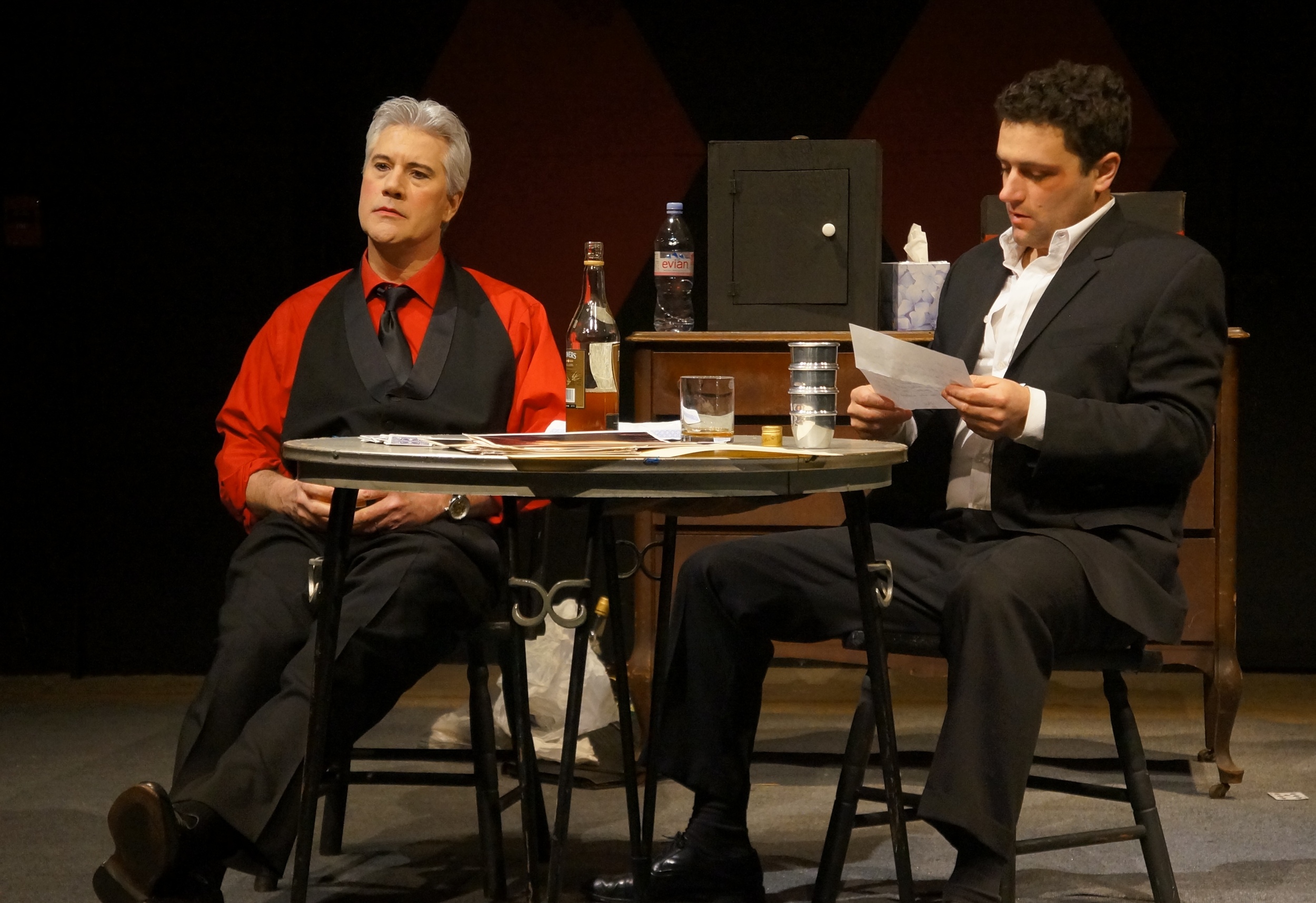Drew Gray’s The Magician, an original play produced by the New Haven Theater Company, possesses the qualities that have made for past successful productions by the group: minimal setting, dialogue-driven scenes, and a feel for the nuance of relationships. The principal characters in the play are Mark Wonderton (George Kulp), a magician on a strip outside Vegas, and his manager, Ronnie (Peter Chenot). The main drama in the play is what, in the course of a whiskey-soaked interim between a matinee show and the evening show, these two friends and verbal-sparring partners will reveal about themselves and, the real suspense, what will happen in the evening show.

The play is risky not only in its minimalism—if we don’t like Mark and Ronnie, no one else is going to show up to relieve them—but especially in its willingness to dramatize that perhaps most pathetic of all performers, the bombing magician. A bombing comic, after all, becomes comical via failure, but how comical can a magician be who no longer wants to make a good impression?
Much of the success of the play depends on the actors finding the right pace for their roles. In the early going the words may fly a bit too fast, a sign, perhaps, that these characters have a private intonation between them that we will gradually become attuned to, but it might also mean that the actors need a little time to naturalize their patter. Have no fear, they do, and we begin to hear very clearly the signals between Mark and Ronnie: what’s off limits, what can be joked about, what is territory they’d rather not explore. There’s a certain air of backstage superstition surrounding it all which suits magic certainly but which also extends to Vegas generally. Don’t bad mouth the Lady is the main injunction. Both Wonderton and Ronnie are not doing badly, or, well, it could be a lot worse.
Because so much is made of the general standing of Wonderton’s act in the first part of the play, as the drinks keep being downed, we may find ourselves skeptical that he’s going to pull off the second part of the play when, mostly alone on stage, he faces . . . us, the audience. One suspects that Wonderton’s inability to produce any magic would meet with a rather more hostile reception in Vegas than the enactment of that inability meets with in The Magician, so that the suspension of disbelief comes not from seeing “magic” performed but in believing a man so incapable of magic would remain on stage.
That’s where the real guts in this play come in. Mark insists on a point that Ronnie disputes: “the box will play.” What he’s referring to, we find, is a box containing, rather than tricks and magical implements, the detritus of his own life. Would revealing the contents of this box “play” for a Vegas audience gathered to see magic? Unlikely. Does it play for an audience gathered to see a play? Uncertain.
Gray’s point seems to be that the sad accumulation of stray bits mirrors anyone’s little pile of keepsakes and that, in the end, these talismanic collections don’t mean a thing. Wonderton, hitting a professional low, is willing to reveal what’s “behind the scenes” or “in the box,” and that plays only so far as what he reveals does indeed reveal something. That’s where I’m not so sure. The collection of things are too generic to sketch for us Wonderton’s individual life, and too minor to inspire in us much identification. We may well find ourselves wondering not only why anyone would keep such things but why he would bother to tell us he did.
More revealing, dramatically, is the relation between Ronnie and Mark. Even after this epic failure on the part of Mark, the give-and-take of manager to performer goes on. There’s a sense that what The Magician aims at is the peculiarities of a life on stage and a life behind the scenes, and the interest in the relation between Ronnie and Mark is in the way they have to remain “in character” with one another no matter what. Gray’s characters are figures “in the life,” in the way that David Mamet’s characters so frequently are, and Chenot is able to give Ronnie both charm and a certain mannered “been-there, done-that” air. Mark is a harder read, and Kulp lets us see some of the cracks in the façade of the seasoned performer, a man for whom “ladies and gentlemen” are forever looking on, and who finds, to his chagrin, he hasn’t let anyone really get “backstage” or into his private life.
Entertaining and risky, The Magician conjures up the tensions between work and life and between public and private, as well as the long-term friendships that, at the end of the day, are the only thing that make it all worthwhile.
The Magician A new play written and directed by Drew Gray The New Haven Theater Company
Mark: George Kulp; Ronnie: Peter Chenot; Samantha: Jessica Donofrio
Design: Drew Gray; Stage Manager/Light Board OP: Mallory Pellegrino; Sound Board OP/Production Assistant: Deena Nicol; Photographs: Susan Kulp
The English Building Markets March 6-8 and 13-15, 2014
